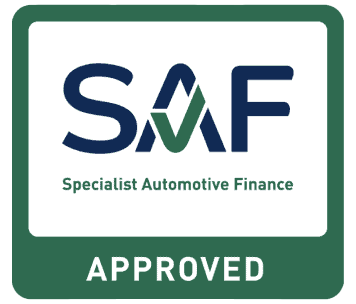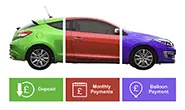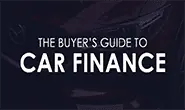Car Finance
Flexible HP & PCP Options
Get flexible car finance with ChooseMyCar. Compare HP and PCP plans, see example payments, and find the right deal to suit your budget — all with quick decisions and trusted lenders.
-
Trusted Lenders from Across the UK
-
Save Money on Your Next Car
-
Ranked #1 out of 102 Car Finance companies*


HP or PCP Your New Car Today
Find the right finance option for your next car with a simple, straightforward process. With thousands of vehicles available, you can compare Hire Purchase (HP) and Personal Contract Purchase (PCP) side by side, explore features, and choose the plan that works best for you.
Car Finance Types – Features and Differences
It’s easier to choose the right finance when you can compare all the key details in one place. The table below shows HP, PCP, Conditional Sale and Personal Loans side by side, highlighting how each option handles deposits, monthly payments and ownership at the end of your agreement.
| Hire Purchase | Personal Contract Purchase | Personal Loan | Conditional Sale | |
|---|---|---|---|---|
| Requires initial deposit | Optional | Optional |
|
Optional |
| You own the car outright |
|
|
|
|
| Car is yours at the end of the agreement |
|
|
|
|
| Fixed monthly payments |
|
|
|
|
| Optional baloon (final payment) |
|
|
|
|
| Excess mileage charges |
|
|
|
|
| Secured against an asset (eg. car) |
|
|
|
|
Car Finance Options Explained
The finance option you choose can have a big impact on the overall affordability of your next car and how your payments are structured over time. Below, you’ll find quick video clips and side-by-side comparisons that clearly explain the key types of car finance and how each car finance product works, helping you decide which is the best fit for your budget and needs.
What Is PCP?
Video Transcript:
Wondering what PCP car finance is and how it works? Let's break it down. PCP, or personal contract purchase, is one of the most flexible ways to finance a car. You pay a deposit followed by monthly payments based on the car's expected value at the end of the term rather than the full price of the vehicle. That usually means a lower monthly cost compared to other types of car finance. When the agreement ends, you've got plenty of options to consider. Trade it in, pay the final balloon payment to keep it, or just walk away. At Choose My Car, we compare a wide range of PCP car finance deals from our trusted lenders across the UK. Our quick, no pressure application gives you tailored PCP car finance quotes in minutes with no impact on your credit score. [Music] Easy, flexible, and built around you. That's PCP made easy. The choose my car way. Apply today or contact us to find out more.
What Is HP?
Video Transcript:
If you're thinking about HP, also known as higher purchase car finance, here's a quick and easy way to understand how it works. With higher purchase, you start by making a deposit. Then you make fixed monthly payments over an agreed period of time. The great thing about this option is once all the payments are complete, the car is completely yours. There's no large final payment unlike other car finance types. This method is really popular with people who want a straightforward, predictable way of spreading the cost for their car, especially if you're planning to keep the car longterm. You'll know exactly what you're paying each month, which can make budgeting easier. At Choose My Car, we work with a wide network of trusted lenders to find competitive high purchase deals that suit your needs. Our nifty application process means that you can get personalized quotes tailored to your situation without any impact on your credit score. Take the next step and apply today to find higher purchase finance that works for you.
What Is Conditional Sale?
Video Transcript:
If you're looking for a straightforward and hassle-free way to finance your next car, conditional sale could be the ideal choice. Similar to higher purchase, you'll begin by paying an initial deposit followed by regular monthly payments spread over an agreed term. The main difference with a conditional sale is once you pay your deposit, you're fully committed to buying the car, which means there's no option to return it later and no additional fees like an option to purchase charge at the end. Monthly payments remain fixed and predictable throughout the agreement, helping you budget with confidence. Once all payments are complete, ownership of the vehicle transfers fully to you, making it a reliable way for you to get behind the wheel for a long time. Choose My Car partners with a large network of trusted lenders across the UK, offering competitive conditional sale deals tailored to your budgeting preferences. Our application process is quick and easy, designed to help you explore the options that best fit your needs. Ready to get started? Apply now and find a conditional sale plan that works for you.
Personal Loan or Car Finance?
Video Transcript:
Personal loans work differently from typical car finance options because they're arranged directly with the lender and not through the dealership. Usually unsecured, they provide you with a lump sum up front, which you can use to buy the car outright. Then you repay the loan in fixed monthly installments over an agreed term. While this might seem simple, personal loans often come with higher interest rates compared to specialized car finance products. Because they aren't tied to the car itself, you won't get the same protections or flexibility. For example, there's no option to return the car at the end of the term or adjust payments based off the car's value. For most drivers, traditional car finance deals tend to offer better value, and more tailored options to suit your budget and preferences. It's still worth understanding personal loans as an alternative, but make sure to consider all of your options carefully before making the decision. If you're unsure on which car finance type is best for you, make sure to check out our other videos on higher purchase and PCP. They could offer the flexible and affordable solutions for your needs.
Check Your Monthly Payments for PCP and HP
Compare PCP and HP monthly payments in seconds with our easy-to-use tool. You can experiment with different loan amounts and terms to see the impact on your monthly budget and total cost of credit, so you can make the right choice for your finances.
Compare PCP and HP monthly payments
Estimated Monthly Budget
Total Cost of Credit
£22,258
Optional Final Payment
£0
Compare HP vs PCP Car Finance
PCP and HP are two of the most popular ways to finance a car, each offering different benefits depending on your budget and plans. Our comparison table lets you explore hire purchase vs personal contract purchase using an example vehicle price, showing the deposit required, any balloon payment, mileage limits, and much more. Use the tabs to switch between HP and PCP and see which option could suit you best.
| Finance Comparison |
PCP Personal Contract Purchase |
HP Hire Purchase |
|---|---|---|
| Learn the details | Get Quote | Get Quote |
| Pricing | ||
| Vehicle Price | £9,998 | £9,998 |
| Deposit | £2000 | £0 |
| Amount Borrowed | £7,998 | £9,998 |
| Terms | ||
| Duration of Agreement | 49 months | 48 months |
| Annual Mileage Limit | 8,000 miles | |
| Total Amount Payable | £12,888.89 | £13,098.24 |
| Total Interest | £2,900.89 | £3,100.24 |
| Optional Balloon Payment | £4,491.13 | |
| Monthly Payment | £134.12 | £272.88 |
Personal Contract Purchase (PCP)
- Vehicle Price: £9,998
- Deposit: £2,000
- Amount Borrowed: £7,998
- Example APR: 11.9%
- Duration of Agreement: 49 months
- Monthly Payments: £134.12
- Optional Final Balloon Payment: £4,491.13
- Total Amount Payable: £12,888.89
- Annual Mileage Limit: 8,000 miles
- Excess Mileage Charge: 14.9p per mile
How it Works:
- Deposit: £2,000 deposit upfront.
- Monthly Payments: 48 monthly payments of £134.12.
- Optional Final Payment: either pay £4,491.13 to own the car, return the car, or trade it in for a new vehicle.
- Total Cost: including the deposit, monthly payments, and optional final payment, is £12,888.89.
- Mileage: 8,000 miles per year. If you exceed this, you’ll pay 14.9p per extra mile.
Hire Purchase Example
- Vehicle Price: £9,998
- Deposit: £0
- Amount Borrowed (Amount of Credit): £9,998
- Example APR: 14.9%
- Duration of Agreement: 48 months
- Monthly Payments: £272.88
- Total Amount Payable: £13,098.24
- Total Interest: £3,100.24
How it Works:
- Deposit: You pay £0 upfront, so the full amount of the vehicle is financed.
- Monthly Payments: 48 monthly payments of £272.88.
- Final Payment: you may need to pay a small option-to-purchase fee (e.g., £10.00) to own the car outright.
- Total Cost: including the monthly payments and option-to-purchase fee, is £13,098.24.
- Ownership: including the option-to-purchase fee, are made, the car becomes yours.

SAF Approved Car Finance Specialists
We stand out not only as a respected car purchasing service in the UK but also as your dependable partner in obtaining car finance. With full authorisation from the Financial Conduct Authority and SAF endorsement, our skilled team is dedicated to assisting individuals by providing customised financial solutions. We assess offerings from more than 17 distinct car finance institutions, guaranteeing that you have the insights needed to secure competitive rates and drive with assurance.
How Car Finance Works with ChooseMyCar
With Choose My Car, understanding how car finance works is easier than ever. Our process is designed to be clear, simple, and supportive, helping you explore your options, understand the costs, and make decisions that fit your needs. It’s all about giving you confidence and peace of mind as you take the next step toward your new car!
-
Step 1: Explore Your Financing Choices
Start with a quick, no-obligation check to see what finance deals you could qualify for, even if you have bad credit. This helps you understand your borrowing power before you commit.
-
Step 2: Get Your Personalised Quote
Receive tailored quotes from a wide panel of trusted lenders. We match you with competitive offers that fit your budget and credit profile, making finance simple and transparent.
-
Step 3: Browse and Choose Your Car
With your finance options clear, browse a wide selection of vehicles- from affordable used SUVs to stylish hatchbacks– knowing exactly what you can afford.
-
Step 4: Apply and Drive Away
Submit your application easily online. Once approved, arrange for speedy delivery, and hit the road in your new car with confidence and peace of mind.
Finance Your Next Car Today!
Discover your next car and get the finance sorted today- it’s quick, easy, and all in one place!
- Home Delivery
- Affordable Finance Deals
- Zero Deposit
- Bad Credit Car Finance
Navigating car finance doesn’t have to be daunting. Our mission is to make applying easy and to connect you with a variety of dependable used cars. Dive into the information and tools on this page to find the best fit for your needs.
Estimate Your Car Finance Payment With APR
Our APR Matrix makes it easy to explore your car finance options in a clear and simple way. Just choose a loan amount and slide across different APR rates to see how your monthly car finance cost could change. It’s a handy way to get a sense of what to expect and see which combination of loan and rate could work best for your budget.
*Borrowing a total of £17,500.00 at an APR of 9.90% will cost £370.96 / month
Compare Our Trusted Car Finance Lenders
See how some of the best car finance lenders in the UK compare. This overview highlights HP and PCP availability, zero deposit options, and other key features from trusted car loan companies, making it easy to understand what each can provide.

|

|

|
|

|
|
|---|---|---|---|---|---|
| Hire Purchase | |||||
| Personal Contract Hire | Lease Purchase | ||||
| Age Min-Max | 21-80yrs old | 20-63yrs old | 18 - no max | 18-68yrs old | 18-75yrs old |
| Joint Hirer | |||||
| Provisional License | |||||
| Self-employed | |||||
| Gross Min Salary | Affordability | £1000 pm | £1000 pm | £800 pm | £1000pm |
| Loan Value Min-Max | £25,000 - £750,000 | £2,000 - £30,000 | £3,000 - £200,000 | £3,000 - £25,000 | £3000 - £35,000 |
| Max Age of Vehicle at end of term | No Limited | 14yrs HP - 7yrs PCP | 15yrs | 14yrs | 14yrs |
| Zero Deposits |
Latest Car Finance Guides and Advice
For reliable car finance advice, check out our comprehensive articles and guides now! Click to explore expert insights and practical tips designed to help you navigate every aspect of car finance with confidence.














